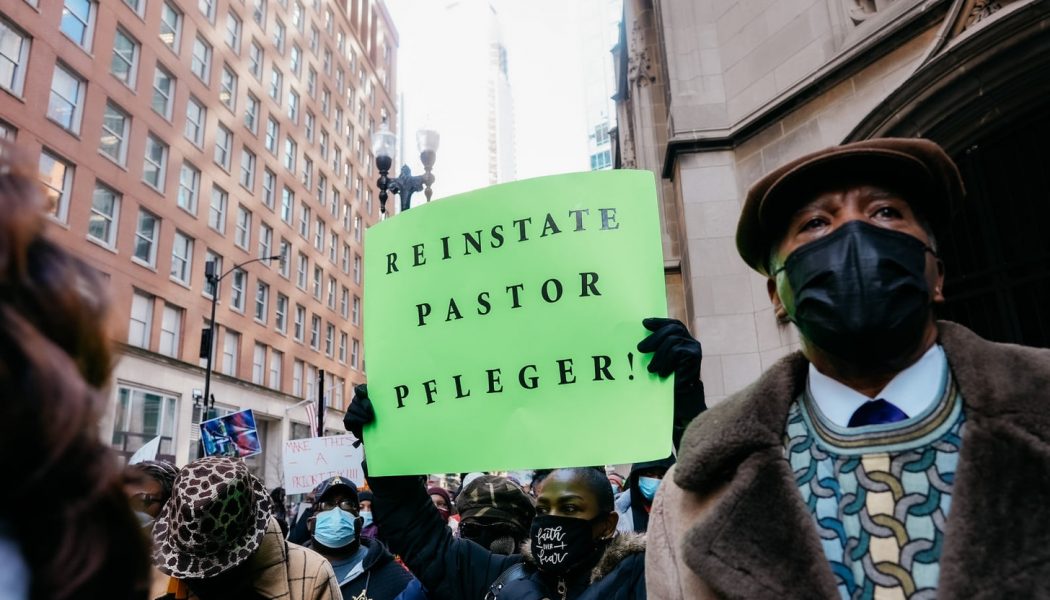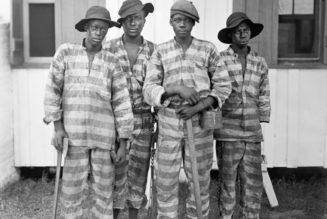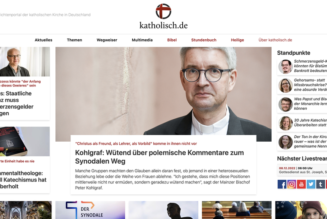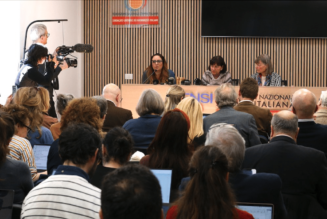Ten years ago, Cardinal Francis George of Chicago and Fr. Michael Pfleger found themselves in a stand-off. Depending on whom you ask, the story could be framed as a misunderstanding that spun out of control. But Pfleger didn’t see it that way, and neither do a lot of other Chicago Catholics.
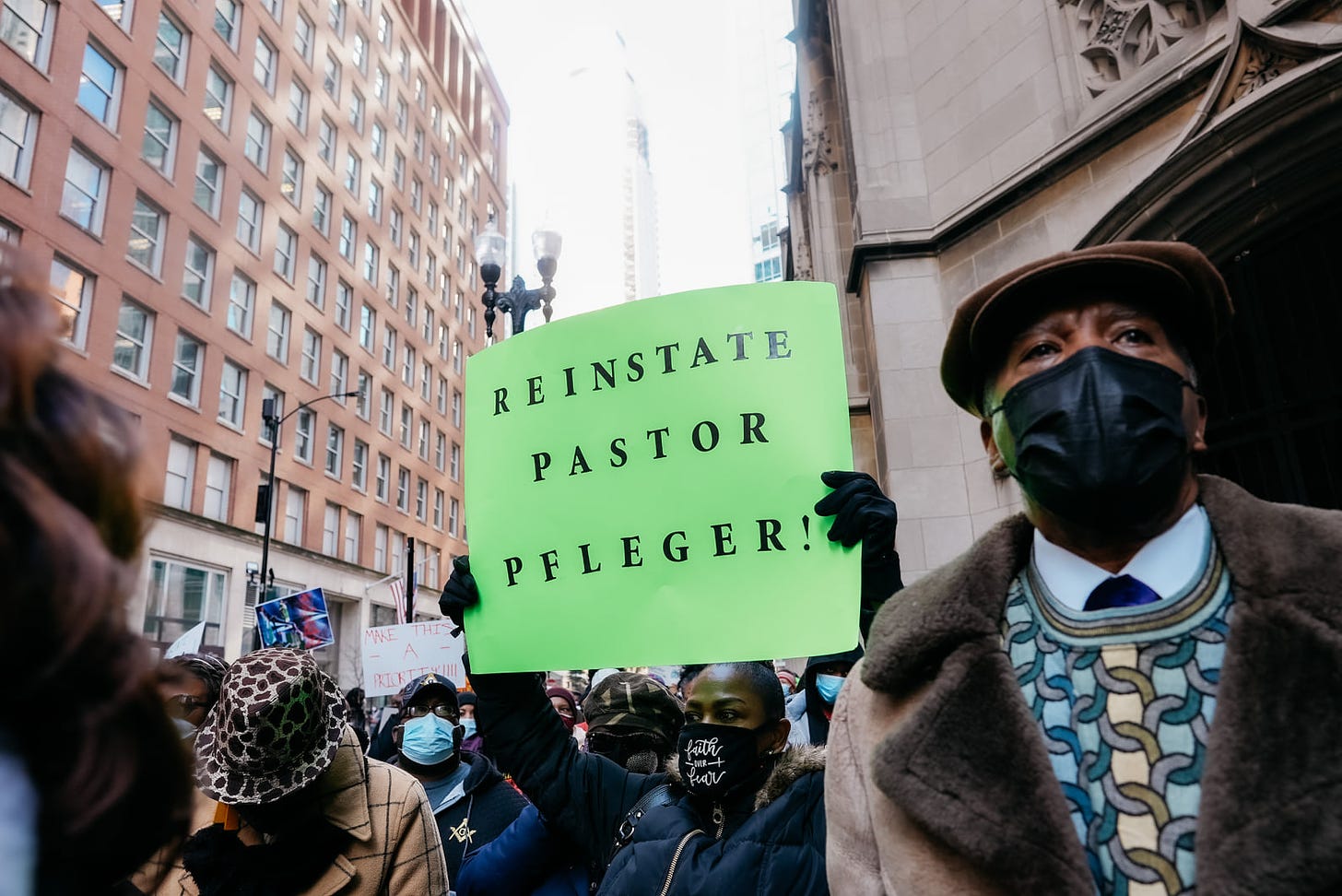
If you accept the idea that the priest and the cardinal stood toe-to-toe at a moment of disagreement, you probably also think it was Pfleger who came out the winner.
That’s certainly how some parishioners at St. Sabina on Chicago’s South Side see it.
Things started with a private conversation. In 2011, George asked Pfleger, who had been a controversial pastor at St. Sabina’s since 1981, to consider becoming president of a nearby high school. George later said that it was an honest invitation, and that he’d understood Pfleger wanted to move on from the parish, where his political and social activism had put him in the spotlight, and at odds with the cardinal, often.
But in April 2011, Pfleger started telling friends and parishioners he thought the cardinal was trying to push him out. He said he didn’t want to go to the school. Parishioners and supporters, including ministers from other denominations, urged George to leave Pfleger in place.
Cardinal George certainly had the authority to transfer Pfleger, but he said the idea was “a proposal, not a demand.”
Eventually, as Pfleger pushed back, he told a radio host that if things came to a head, he would think about leaving the Catholic Church before leaving his parish.
George suspended him.
In a letter to Pfleger, the cardinal lamented “your remarks on national radio and in local newspapers that you will leave the Catholic Church if you are told to accept an assignment other than as pastor of Saint Sabina Parish. If that is truly your attitude, you have already left the Catholic Church and are therefore not able to pastor a Catholic parish.”
“Father Pfleger, I deeply regret that your public remarks have brought you to a moment of crisis that I pray will quickly pass. This conflict is not between you and me; it’s between you and the Church that ordained you a priest, between you and the faith that introduced you to Christ and gives you the right to preach and pastor in his name. If you now formally leave the Catholic Church and her priesthood, it’s your choice and no one else’s. You are not a victim of anyone or anything other than your own statements,” George wrote.
Three weeks later, Pfleger issued a statement. “If my remarks in a radio interview seemed to be a threat to leave the priesthood, I am sorry. That was not my intention. I am committed to the priesthood and the Catholic Church,” it read in part.
George added his own statement, which told the rest of the story: “I am personally pleased to restore Father Pfleger to his sacramental and pastoral ministry at St. Sabina and in the Archdiocese of Chicago. With him, I ask the Lord to bless him and the people he loves.”
Some in the Chicago presbyterate tell The Pillar that Pfleger challenged his bishop, to whom he had promised obedience, to a game of chicken — and he won.
Pfleger returned to his parish. While there were more controversies, there seemed to be no further plans to move Pfleger, who eventually adopted the title “senior pastor,” even while retaining administrative control of the parish.
The priest has told some friends the episode is an example of standing up against injustice, the principle in which he had believed his entire life, and one of the defining principles of his parish community.
The history is worth understanding, as a decade later, parishioners at St. Sabina have said they will withhold their monthly assessment and other payments to the diocese, $100,000 monthly in total, until a canonical investigation into Pfleger is concluded.
Pfleger is accused by three men of sexually abusing them in the late 1970s. Two of the men are brothers, one is unrelated to them. The priest says he is innocent. His parish has supported him — parishioners, the “Parish Cabinet,” and local leaders have made statements and demonstrated, supporting Pfleger’s claim that an attorney for the alleged victims “has shamelessly used the media to smear the reputation of a truly good priest and advocate for his community in a sordid attempt to get some celebrity time on TV for him and his clients and some money from the Archdiocese.”
The parish announced Feb. 28 it would begin withholding the assessment, or tax, imposed by the diocese on the parish, until the matter was resolved. It said the tax amounts to $13,000 monthly, and that it would withhold another $87,000 in monthly insurance payments and other financial obligations administered through the diocese. Some Chicago priests have expressed skepticism that the parish actually gives the diocese anything like that amount monthly. But whatever the amount, the decision to withhold payment is an escalation of the parish’s advocacy for its pastor.
The announcement also represents a challenge for Chicago’s Cardinal Blase Cupich.
If the decision to withhold the funds was made by Fr. Thulani Magwaza, who has been parish administrator in Pfleger’s absence, Cupich has a disobedient priest on his hands. Refusing to pay a diocesan tax until your bishop agrees to your demands is the kind of thing that might easily be classified as schism — the refusal of submission to the legitimate governance of one’s legitimate superior. But even if Cupich decides the act isn’t schism, it could also be understood as one of any number of canonical crimes involving abuse of ecclesiastical office.
If the decision was not made by Magwaza, but by the parish “Cabinet,” which has offered numerous statements in recent months, then Cupich has in his diocese a parish whose administrative control has been effectively turned over to a committee of laypeople— also a canonical problem, to say the least.
In all likelihood, the cardinal will not want to escalate the situation further by doling out or declaring canonical penalties or precepts from the chancery downtown. He’ll most likely dispatch an auxiliary bishop to meet with Magwaza and the “Cabinet,” and, if that proves unsatisfactory, meet with the group himself. The cardinal will probably hope to talk them out their position before matters get more serious.
But Pfleger’s case right now is being considered by the archdiocesan review board. If the board believes the claims against him have the “semblance of truth,” and Cupich agrees, the matter will be sent to the CDF for review. The process in Rome will take months, if not longer, and Pfleger may never return to ministry. In short, if Cupich doesn’t have things under control by the time the case is sent to Rome, it may become far more difficult for him to talk the parish into letting the process of justice run its course.
Father Michael Pfleger has long urged his parishioners to stand up for the things they believe in. Many believe they are doing so now. As to whether those beliefs extend to the hierarchical nature of the Catholic Church — and the obligations that go along with that — Cardinal Cupich will soon find out.
Join Our Telegram Group : Salvation & Prosperity
